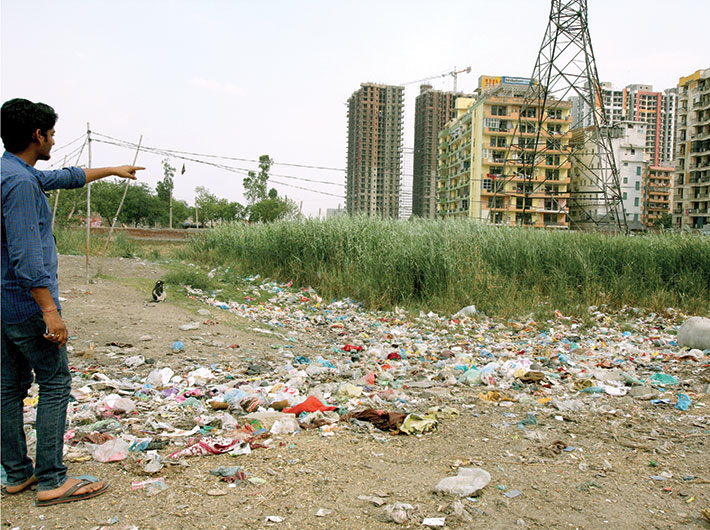Behind the violence in a village on the outskirts of Delhi was a nexus between land sharks and the administration – and not caste rivalries
It had all the makings of a caste war. Mobs hurling stones and firing guns, one death, many injuries, properties damaged, and a school razed to the ground. Then tempers cooled and the police began to investigate. Turns out it is just another real estate battle over premium land in the national capital region (NCR).
A unique jurisdictional case, it has to do with Kanavani village in the middle of Indirapuram in Ghaziabad. For administrative reasons, it is under the neighbouring Gautam Budh Nagar (Noida) district.
The flashpoint was the morning of April 28. Deshraj Kasana, a former village head from the Gujjar caste, along with his brother and nephew went to a plot of land to raise a token construction there and claim ownership. Chaman Singh and Subhash Jatav of the dalit Jatav community objected, claiming the 65 square metres of land. They soon came to blows, shots were fired, and before anybody knew what was happening, a 22-year-old man named Rahul Kasana was killed. Rahul, a BCom student, was from an upper caste Gujjar family, and the tragedy pitted people on caste lines.
Thus, the Siddhartha Public Niketan, a school with only dalit students, was bulldozed the same night. Several dalit families fled their homes fearing retaliation. Police forces had to soon camp in the village. A week later, on May 5, JN Chamber, secretary to the national commission for scheduled castes, came visiting along with his team to determine whether the dalits were facing caste discrimination.
A visit to the troubled village, however, reveals business rivalry. Residents say Chaman and Subhash had good relations with the Kasana family and they worked together for years in the real estate business.
A partnership of convenience
Prithvi Kasana, Deshraj’s nephew who also runs a real estate business in Indirapuram, says, “Chaman always used to come to our house. Our uncle once gifted a Maruti Alto car when his (Chaman’s) daughter got married.”
The good relations were of course based on complementary business skills. “The Kasana family and Chaman worked hand in glove in capturing land of LMC (the land management committee of the local gram sabha). Deshraj Kasana has a reputation for occupying LMC land and then demarking plots. Jatavs ensured the registry of the land,” says a former deputy head of the village panchayat.
Residents recall several incidents from the past one year that indicated strained relations. Chaman and Subhash had acquired enough clout to challenge the Kasanas, they say.
“Last year Chaman and Subhash tried to grab a plot of government land and put a statue of Babasaheb Ambedkar in it, but Kasana wanted to corner it himself, and he put a Lord Shiva statue in place of Ambedkar. The two sides were going to come to blows but a senior police officer intervened and sorted out the matter,” says Ashok Nagar, who runs a shop in the village.
Chaman is a panchayat member and his aunt was the village head 10 years ago. Now, the village head is from the Kasana family: Jagwati Kasana. The changes in power equations have affected business dealings. What happened on April 28 was not unexpected.
“It began with a little scuffle. The Jatavs approached the police, which did not turn up immediately. Chaman had this apprehension, so he was prepared and had come with blunt and sharp edged weapons,” says a dalit shop owner. “Rahul was innocent – he was asking his uncles and cousins to refrain from violence. How he died is a mystery.”
Several residents believe the shot that killed Rahul was fired, by mistake, from his uncle’s revolver. Satyaveer Kasana, father of the deceased, refutes the claim. “They (the Jatavs) were firing as they were in numbers. We were unprepared. My son came out of the house to stop the fighting but he was killed,” says Satyaveer, showing his finger that sustained a bullet injury.
After a round of retaliaory violence, better sense prevailed over the two sides. The shocked villagers are not in the mood to blame one or the other community. (Kanavani has a population of about 8,000, 60 percent of which is from the scheduled caste community and the remaining from the Gujjar.) They only blame the administration as police reached one and a half hour after the violence began
An administrative wrangle
Preetinder Singh, senior superintendent of police of Gautam Buddha Nagar, says, “Our primary duty is to maintain law and order. We have succeeded in restoring peace. We have taken this matter seriously and culprits will be brought to justice. Anybody trying to create mischief will be dealt with.”
The role of the administration has also come into question. Though the village is situated in the middle of Indirapuram in Ghaziabad, it is within Noida in government records. Villagers say the police were delayed in reaching the scene of crime because calls to the emergency number 100 went to the Ghaziabad police, who asked them to redirect their complaint to the Noida police instead.
Why this anomaly? Villagers point to sprawling farmhouses – more than 50 of them – that would have been acquired by the Ghaziabad Development Authority under the rules. Noida authorities, however, do not have much of an interest in an isolated village in Ghaziabad. For years, the administrative transfer is mired in red tape.
There is no guarantee the dispute will disappear. The real estate boom in the NCR has fueled the greed of land dealers, and corrupt elements in the administration. This sustains the land sharks with conflicting interests.

